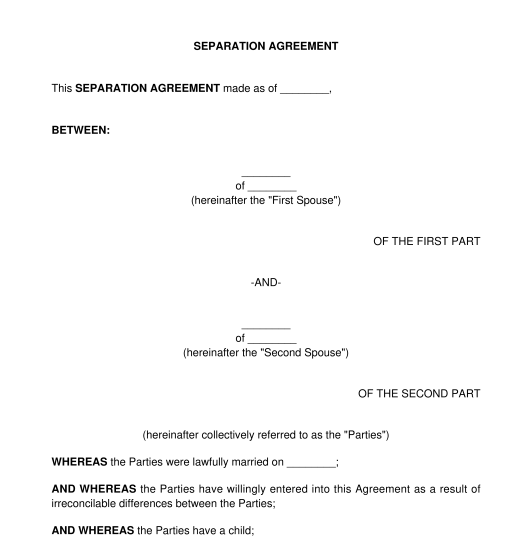 05/11/2025
05/11/2025

Answer a few questions and your document is created automatically.

Your document is ready! You will receive it in Word and PDF formats. You will be able to modify it.

 05/11/2025
05/11/2025
 Word and PDF
Word and PDF
 6 to 9 pages
6 to 9 pages
A Separation Agreement is a contract between two spouses when there is a breakdown in their relationship. Separation Agreements are typically entered into if the spouses are married and begin living separately and apart due to a breakdown in the relationship. However, if common-law spouses have had a child together or have property they own together, they may choose to enter into a Separation Agreement.
No. Having a separation agreement isn't mandatory, but it's a useful agreement that allows the separating spouses to agree on important matters, including:
A written agreement allows the spouses to enforce its terms in the event of non-compliance with what they agreed on. An oral agreement is substantially more difficult to enforce.
The Separation Agreement will cover the rights and obligations of the spouses, including:
The division of property: the division of property refers to dividing the assets that the spouses have accumulated together.
The spouses cannot agree on child support payments that undermine the legal guidelines. In other words, the child support payments must be reasonably consistent with the guidelines.
The agreement cannot contain any unfair or unconscionable clauses that significantly favor one spouse over another.
For example, an agreement where one spouse obtains most of the assets despite the fact that both spouses have equally financially contributed.
Only spouses in a relationship, either married or common law, may enter into a separation agreement. For married couples, one of the grounds for a divorce is separation for one-year. Therefore, a married couple may sign this agreement. Also, common law spouses who have a child together or have lived together for more than three years may enter into this agreement.
It's important to note that the signatories must be of the age of majority and not under a disability. The ages of majority are as follows:
For married couples, the law usually requires that spouses separate before they can file for divorce.
For married couples, the Separation Agreement can be a permanent or temporary contract. Usually, the agreement is permanent and survives the divorce, if any, so the spouses may continue enforcing it.
In other words, some spouses may agree that the contract only applies until the date of divorce; or they can agree that it survives the divorce. The purpose is to allow spouses to keep enforcing the contract after divorce. If the spouses weren't married, the agreement doesn't survive divorce.
A Separation Agreement is an amicable, more affordable solution than going to court. The agreement is only enforceable if the following requirements are met:
Once the separation agreement is ready, it must be signed, and the parties must start implementing its terms. This means either transferring property, paying the support obligations, and communicating about the children, if any. In some Provinces, the spouses may have the option of filing their Separation Agreement with the court. The benefit of which is it allows the court to enforce the agreement. This means the court will have the spouses' agreement on file and may be able to ensure that the clause requiring support payments is honored.
Each spouse must keep a copy of the signed agreement for their records.
No. Registering the separation agreement is not necessary, but the spouses may choose to file their Separation Agreement with the court. The benefit of which is it allows the court to enforce the agreement. To do this, the spouses will need to attend the family court branch of the courthouse in their jurisdiction. The spouses will also need to sign an affidavit stating that the contract remains in effect.
Yes. A separation agreement requires witnesses in order to be valid. Each signing spouse should have an independent witness to their signature. In other words, there should be two witnesses, such as a lawyer, notary, or other adult. The witnesses must be of majority age and not under a disability. The ages of majority are as follows:
If the document is not witnessed, it can be found invalid. An invalid document means it cannot be enforced.
Separation Agreements are a type of domestic contract, which is governed by the law of each Province and Territory. Additionally, if the spouses are getting divorced, the Canada Divorce Act (R.S.C., 1985, c. 3 (2nd Supp.)) applies. The pieces of provincial and territorial family legislation are the following:
You fill out a form. The document is created before your eyes as you respond to the questions.
At the end, you receive it in Word and PDF formats. You can modify it and reuse it.
Separation Agreement - Sample, template - Word and PDF
Country: Canada (English)